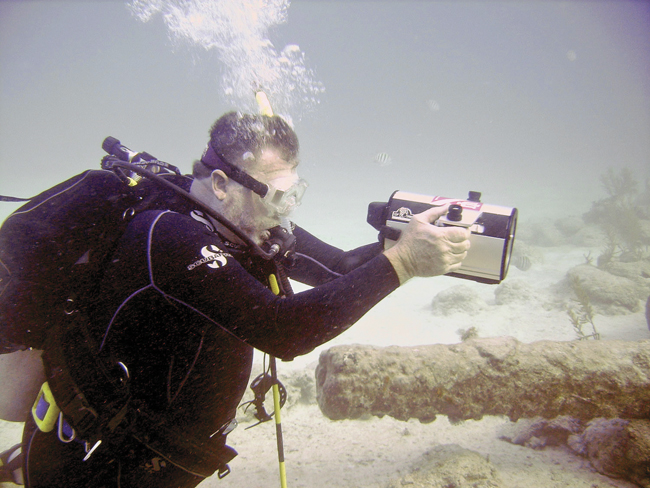BY JEREMY SHERE
When Charles Beeker isn’t holed up in his subterranean, nautically themed lab in the basement of the IU Health, Physical Education and Recreation building [now the School of Public Health], he’s usually somewhere in the Caribbean, underwater, racing to save sunken ships and other undersea artifacts from unscrupulous treasure hunters.
“I’ve been working for years to put treasure hunters out of business,” says Beeker, 57, director of the Academic Diving and Underwater Science programs at IU. “Why should a bunch of mercenaries be able to loot shipwrecks and destroy these important sites?”
In other words, Beeker is sort of a modern day Indiana Jones, without the whip. He even got in a bar fight with a frustrated treasure hunter in the Dominican Republic. “This drunken American came staggering toward me and started getting a little rowdy,” Beeker recalls. “The guy had spent his savings and lost his marriage, and I guess he blamed me.”
The thwarted treasure seeker was upset because he’d been after something that Beeker had found in 2007: the submerged remains of the Quedagh Merchant, a ship belonging to the infamous 17th-century pirate Captain William Kidd. The discovery made international headlines and was the subject of a National Geographic documentary.
“I’ve been to thousands of shipwreck sites and most have been looted,” says Beeker, who in 2008 was awarded $200,000 from the U.S. Agency for International Development to turn the Captain Kidd shipwreck site into a protected underwater park. “But I was amazed to find that the Kidd site was pristine—nothing had been touched.”
While Beeker may be best known for discovering Captain Kidd’s ship, it’s hardly his only contribution to underwater archaeology and preservation. In 1988 he helped author the Abandoned Shipwreck Act, a federal law that led to Beeker’s involvement in the creation of one of the country’s first underwater parks in 1989 off the coast of Florida—the San Pedro Underwater Archaeological Preserve State Park. More recently, Beeker and several IU graduate students last year found two complete extinct sloth skeletons and an extinct primate skull in a ceremonial “sink hole” in the Dominican Republic.
A self-described workaholic, Beeker is currently juggling several projects, including a partnership with National Geographic to look for the lost ships of Christopher Columbus, believed to have sunk near La Isabela, on the Dominican Republic’s northwest coast. If he’s successful, Beeker says, “Columbus will be my most significant discovery yet.”

















Hello Charlie,Hope all is well.I talk to GARY,an Lester time to time.Retire from ups now,going to be a camp host in boulder Colo this Sumner,on Brainerd lake.Come up if you near the area,Take care.jack
That is an interesting picture, since the Guadeloupe is completely covered with sand and there are no cannon (guns) on the surface. Not one, so that is not the site.
In a short sited approach to reality only Charley and a few of his students will ever see the amazing history of the ocean, unless of course you dive and are not in a wheel chair. (which in truth is about .001% of the world population)
I used to think like Charley, that shipwrecks just laid there waiting to be discovered, sort of like “The Little Mermaid”. But after working in the ocean for almost a decade (I started November 15th 2005) I can tell you first hand that the ocean is not preserving shipwrecks any more than a tornado is preserving trailer parks in Oklahoma.
This is a silly and selfish approach…….instead lets recover the artifacts display them world wide and allow the history to be taught and explored. Also there is a small but important fact that shallow water ship wrecks generally are located on reefs….and the reefs get plugged with sand and the coral dies and then the reef is dead…they need to be removed. Can you see any wild life in the picture of Charley? Not one fish, why? Because the reef he is on is dead. there is no reef left there, it’s covered with sand because the wreck works like a giant snow-fence, nothing in nothing out. until ocean can cover it. Covered reefs die. ( this picture is most likely from the Captain Kid site, which was actually discovered by Tracy Bowden and Burt Webber and is about 200 miles from the Guadeloupe site….Oh it’s true Charley was with them, but they were on Tracy’s boat using Tracy’s gear and Burt’s research….It’s a small world we live in as underwater folks, and the facts are known. Just not by this magazine.
Wilf Blum
President
Deep Blue Marine Environmental Inc.